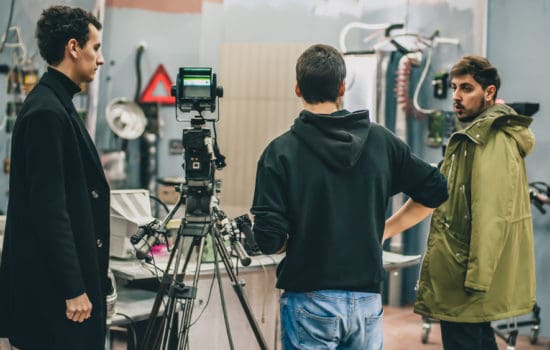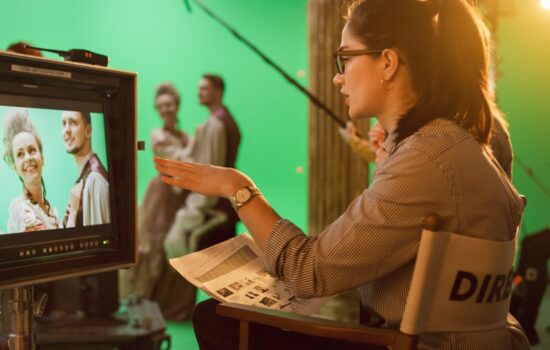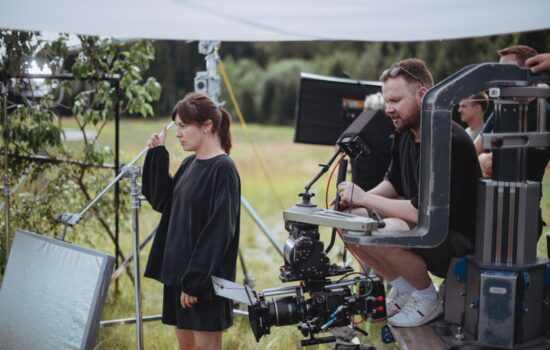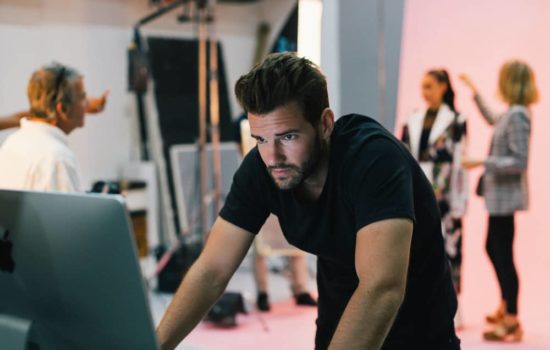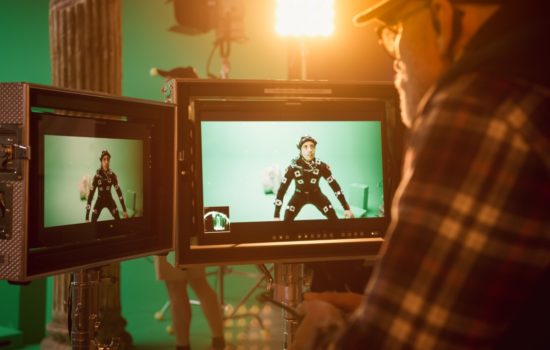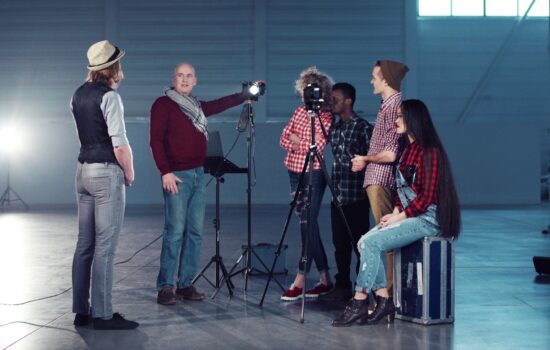Casting Director

How To Become a Casting Director
People also ask
Career Description
A Casting Director (sometimes referred to as the CD) assists in putting together the cast for a project.
Before a script ever reaches their hands, a Casting Director must have comprehensive knowledge of the acting world so that they can make informed selections for each project.
When provided the script for a production, the Casting Director will carefully analyze each role and create breakdowns that explain the type of Actor or Actress needed for them. They’ll then sift through candidates and either bring in talent for auditions or request self-tapes to screen and review.
What does a Casting Director do? This video explains.
Once a Casting Director has found a selection of Actors and Actresses who are a solid fit for each role, they’ll send those options to the Director, Producer, and any other decision-makers who make the final hiring decisions.
Because of their eye for talent, Casting Directors play an integral part in bringing film, TV, and commercial projects to life.
But how do you become a Casting Director? What skills, experience, and education do you need to build a career in casting?
We spoke to the following Casting Directors to find out:
- Tiffany Little Canfield (Mean Girls (2024), The Color Purple (2023), Only Murders in the Building)
- Jessica Daniels (Single Drunk Female, Master, Helpsters)
- Lisa Ystrom (Letters to Santa, Invitation to Murder, A Nashville Country Christmas)
What does a Casting Director do?
We are primarily responsible for finding the Actors to do roles for different projects, whether it’s film or TV. A pilot or a movie might already come with a famous person attached, like “the new Julia Roberts movie.” It’s usually well-known Actors that are attached, and then for all the rest of the roles, we provide choices to our Producers, the studios, the networks, or all three. Ultimately it’s not our decision. We certainly guide it when we bring them the choices, but we’re not the ones paying for the project.
With each project, the knowledge on the other side (the studios, Producers, and networks) is different. So we provide them with the choices. That can be through actually auditioning Actors, which is what the most common assumption is. We can make lists of ideas. And then we watch demo reels. There are ways that we go about putting the ideas in front of them. But we’re responsible for giving them the ideas.
A Casting Director is in charge of assembling the cast for a play, musical, TV series, film, or commercial–any theater or acting project. You work with talent in a variety of ways: working with lists of known Actors that you might potentially offer, holding auditions, callbacks and tests, and offering the roles.
A Casting Director serves as the person on your film or television series who brings your story to life with Actors. Usually, that starts at the very beginning of the process where the Casting Director will read the script and have some ideas right off the bat. You’re casting your leads, oftentimes with Actors who are known, all the way down through to the supporting roles, and then the one-line roles.
The Casting Director will usually work on all of the speaking roles. It’s an interesting position because we are one of the first people that are hired on a project. But we’re usually not on set, so by the time we get to see it, it’s gone through a whole evolution. We’re really critical in the pre-production process.
How does the casting process work?
It depends on the project. We start with the script and analyze the roles. We create lists of known Actors to see if there is someone that the creative team would like to make an offer to….and then we release breakdowns of the roles to Agents and Managers, who submit their talent.
We comb through those submissions and decide who seems best suited and schedule them for auditions, both in person or self-tapes. We send our selects from those auditions to the creative team and discuss potential callbacks.
For film, I’ll read a script and I’ll do a breakdown of the characters, of the roles. Occasionally, there’s already an Actor attached to one of the lead roles. But most of the movies I work on have actually been completely clean slates. I’ll determine which of the roles might be what is called “cast contingent,” in other words, if we need somebody that’s well known to bring some financing to the movie or to make sure that the movie gets made.
Then, I’ll also make lists of ideas for the supporting characters, and we work in stages. We’ll put out offers on the lead roles to Actors that you probably know.
We try to be really targeted in our list. Sometimes I liken it to a college list. You’ll have a reach or two, but you also want to go to Actors who you think would do a movie in your budget range or are looking to play that type of character or work in that kind of genre.
Hopefully, you’ll get one of your top choices–as long as you make your list smartly–and not have to go to a safety choice. Although, sometimes those can be surprising and really wonderful as well.
Then with the supporting roles, some of those are offers, and some of those are going to be auditions where we’re bringing Actors in. Casting Directors have a really broad knowledge base so we know a lot of Actors. We know who to bring in off the bat, but we’re also continually working, continually meeting new Actors. So, we’ll put our character breakdown notice out to Agents and Managers and get their ideas, and that’s how the process really kicks off with auditioning.
Usually, it’s at least 10 weeks out from the movie being shot that you start the active audition process. The attachment phase is before that. Sometimes it’s months. Sometimes it could even be years. The Actor coming onboard is what triggers the financing.
Somebody has written a script, whether it’s TV or film. Then, depending on the size of the project, like if it’s a studio project or an indie project, they decide who they want to have cast the project, or … they start interviewing Casting [Directors]. So once we are attached to being the Casting Directors, there’s usually a casting concept call—like a conference call with all the creatives involved, like “this is kinda who we’re thinking for this part,” or they throw out prototypes.
Then we release a breakdown. There’s a service called Breakdown Services; that’s what gets sent out to all the Agents and Managers. It’ll have the name of the project, whether it’s a film, movie, episode of TV, a pilot, or a commercial. What studio it is, what network it is, who the Producers are, who the Writers are—it has all that info, and then it will list the characters we’re looking for. So that gets released and then the Agents and the Managers submit.
That can be either at the start of when we audition Actors, or simultaneously as it’s happening, depending on if it’s a pilot or a movie. We’d be coming up with our lists and what we’d do is called “checking avail” so we’re seeing if people on our list are even available for the project. And then … we narrow down the auditions. We don’t send them everything that comes in.
If it’s an indie film, we watch the auditions, narrow it down, then send them to our Producers so they can choose who they want. If it’s a TV series, we send those choices to the Producers. The Producers decide who they like, and then we have to get approval from the studio. Then once the studio has signed off, we have to get approval from the network.
If it’s a bigger film, Producers are the first step after us, and then the studio. Once they decide who they want, we can hopefully just go ahead and hire them. If it’s a show, sometimes we put them on what’s called “avail” because we might not have the actual shooting schedule, and we can’t hire somebody without a shooting schedule on a TV series. Then hopefully that person is still available.
There are times when that person becomes unavailable, so you have to really be communicating with the people as you’re going through the process. Like, “Look, they really like them, don’t let anything happen to them,” but sometimes stuff does. We’re there from the idea of it until the hiring of the Actors.
Salary
According to ZipRecruiter, the average annual salary for a Casting Director is approximately $71,554. The salary range for Casting Directors runs from $61,000 to $82,500.
It’s important to keep in mind that numerous factors can impact an annual salary, including the scope of the project, the experience of the Casting Director, and the number of projects a Casting Director is hired for over the course of a year.
Thinking of becoming a Casting Director? This video offers advice on how to create your career.
A Casting Director who is a Teamsters member will likely also make more on account of the regulations implemented for base pay rates within the union.
How do Casting Directors get paid?
Casting Directors typically work as independent contractors, which means they’ll usually be hired temporarily by a production company or studio to determine the casting choices for a project. The amount that a Casting Director is paid will depend on their experience, the overall budget of the project, and their union status.
Who is the highest paid Casting Director?
The amount of money a project makes doesn’t necessarily mean that the Casting Director was well paid for it. For that reason, it’s challenging to determine the highest paid Casting Director based off a film’s gross revenue. That being said, some Casting Directors with great experience and a highly regarded reputation can likely ask for a higher payday. Among those in this category are Sarah Halley Finn, Janet Hirshenson, Jane Jenkins, Debra Zane, and Allison Jones.
Hey, what do you think about trying our new Film Career HelperFilm Career Helper really quick? It’s totally free and could help get your career moving fast! Give it a try. It’s totally free and you have nothing to lose.
Career Outlook
The aim of a Casting Director is to find the right talent for a given project whether it’s a coming-of-age romance, graphic horror story, historical biopic, or other type of project.
Not only must a Casting Director have an in-depth understanding of what is needed for each genre and role, but also they must find Actors and Actresses who can fit the vision of the Director and budget constraints of the Producers.
All that being said, a Casting Director who can successfully fulfill those needs is Casting Director who will be in high demand.
Like many other specialties in the production world, the career of a Casting Director can be a competitive one.
Renowned Casting Director Avy Kaufman offers tips and insights for beginners to the craft.
Just as there’s normally only one Director, Cinematographer, or Editor on a given project, so too are there only so many job openings for Casting Directors – especially when it comes to high-profile, studio-backed productions that typically are the most lucrative gigs.
Much of what determines a Casting Director’s success goes beyond their knowledge of the acting world and who will work best for a given project. That success also depends on the relationships a Casting Director forms with Directors and Producers and the trust built between them.
In short, when a Casting Director shows that they can deliver what a Director and/or Producer is looking for in talent for a project, Directors and Producers will be more likely to want to work with that Casting Director again in the future.
Career Path
It’s a common refrain in Hollywood, but there’s no one way to becoming a Casting Director in the entertainment industry.
That being said, many aspiring Casting Directors begin their careers as Interns, Casting Assistants, and Casting Associates. Each position represents a professional steppingstone towards becoming a Casting Director with increasing levels of responsibility.
An Intern will most likely come on board while still in college, which is another common facet of an aspiring Casting Director’s career. Because Casting Directors work so closely with Actors and Actresses, someone entering this field may start off by studying acting or film in college.
What does a day in the life of a Casting Director look like? Jane Frisby gives an insider’s look.
Depending on the production opportunities available to students, an aspiring Casting Director might also have the chance to cast for student films or small, local short films.
Emerging Casting Directors may also take entry-level positions in talent agencies that represent Actors and Actresses as a way to better familiarize themselves with talent.
Some Casting Directors even begin as Actors themselves!
No one knows better than an Actor or Actress what it takes to bring a role to life, which is why Actors who transition to Casting Directors are often so successful at their jobs.
How do you get into casting?
I think there are a lot more roads to casting now than there were when I started out. The Casting Society of America has a mentorship program, and there’s also a training program. There are a couple initiatives.
One really great thing to start doing is to watch the documentary Casting By, about the Casting Directors Marion Dougherty and Lynn Stalmaster. They were two pioneering Casting Directors. It’ll give a sense of what the profession is.
Several universities also offer casting classes. I know NYU has some, Syracuse does, and I’m pretty sure there are other regional schools in other areas of the country, not just the East Coast, that offer classes in casting.
But it used to be really internship-based, where you would kind of have to work for free just to get your foot in the door. I think as an industry, we’ve stepped further away from that these days; it’s not as advisable to either offer or take unpaid internships because it can be really hard financially. But you can do a fair amount of digging on your own.
Watch as many films, as much TV as possible, and keep track of which Actors you like. That’s important. Your taste is something that’s eventually going to be what leads people to hire you, so it’s something that’s great to develop early. A lot of times, it’s hard to put a finger on what your taste is, or describe it through words, but start making lists (which is something that Casting Directors do all the time) of who you like and why.
And if you don’t know why, maybe you can keep that part blank for the meantime. But who really speaks to you? Whose performances really speak to you? Not just like the standard Meryl Streep, Tom Hanks, Denzel Washington. Who are the Actors that not everyone knows, that you saw … in a small role in a movie, or a show, or theater? There are Actors in so many places now online, and if you see someone’s performance that really sparks something in you, that’s important to remember.
It depends. There’s no one way. It’s not like, “If you do this then you can become a Casting Director.” There’s no straight answer like that because you don’t go to school for it. There’s no, “Take this course to become a Casting Director.” That doesn’t exist.
Some people have become Actors and then decide to get into casting. Film and TV majors certainly help. But by no means does that guarantee it or mean you even want to do it. I originally worked at an agency and made the transition over to casting. That’s a big one: where people work in agencies or casting companies and get to know Casting Directors because of that and think, “Oh, that’s where I want to be,” and they’re able to then go work in those companies.
Say somebody is reading your articles and in film school: some casting offices—not all—are able to hire Interns. And if it is something that somebody is really interested in, they can reach out to different casting offices and see if they’re looking for Interns.
The traditional casting pathways have been internship-based. That could all be changing now because of COVID and many casting professionals working remotely. There’s been a social justice movement in 2020 and one of the things we’re really finding out is any kind of job that is an internship-based pipeline implies some privilege. A lot of times internships are unpaid, so you have to go to the right kind of school, you have to be able to afford to live in New York or LA, working for free. There’s a lot of privilege.
The Casting Society of America has a new initiative to find ways around this very limited pathway. I’d start with that website and see how you can connect to people and get involved. There is a program that teaches the skills needed to be an Assistant, and many avenues and programs to get involved.
Experience & Skills
Even the most ambitious and dedicated Casting Director has to start somewhere. As mentioned, no one makes the leap immediately into this role.
Typically, a future Casting Director will work their way up from Casting Assistant or Casting Associate. This allows them to gain experience working with talent and understanding how to anticipate and fulfill the needs of Directors and Producers.
An encyclopedic knowledge of different Actors can certainly be a plus for an aspiring Casting Director, as well as a strong network of connections with Directors and Producers.
This video provides a comprehensive look at what Casting Directors look for in talent.
However, they must also understand how to communicate effectively with all these different creatives in the entertainment industry.
While it’s not the job of a Casting Director to inform an Actor’s performance for a role, they should understand how to give instruction during an audition to determine if the Actor in question is receptive to feedback.
Likewise, a Casting Director may need to “read between the lines” of a Director or Producer’s notes to discern what it is they are looking for in an Actor or Actress for a given role.
Once the Director and/or Producer decide to cast a particular Actor or Actress, the Casting Director will also be involved in the negotiation process with the talent’s Agent regarding their salary and other compensation. They will likewise oversee their contracts for the duration of a production.
This means that a Casting Director must be up to date on the general rates for various types of productions, especially those that use SAG talent and understand to put forth only talent for which a production can budget.
What skills do you need to be a Casting Director?
You need a knowledge of Actors. You need to be able to see talent in people. Somebody might walk into your room and do a really bad audition, but you might be able to see something there that another Casting Director, or an Associate or an Assistant, might let go right out the door. So you need to be able to spot potential in people and then bring it out sometimes.
We read with the Actors. My partner and I, when the Actors come and audition with us, we’re literally the people reading the scenes with them. It’s not like I have to be an Actor and have that background, but I have to be able to do it. To be able to direct them—which, once again, I don’t need to be Steven Spielberg—but I need to be able to direct Actors in some capacity.
You need to be diplomatic because you’re the middle man between studios and Producers and networks and Agents. You’re dealing with a ton of different personalities so you need to be able to get along with those. You need to be open-minded. The script says, “White male, 40s.” Maybe you go, “Could it be a woman of color?”
You need to be organized. You need to be able to multitask. You’re dealing with several things going on at the same time, even though I listed a certain chronology. Maybe you’re working on a show and you need to be finishing up one episode and starting another episode. There are multiple parts. Maybe you’re casting 15 parts in a project. You need to be keeping track of everything. I’m a big list person and a big chart person, so that helps me.
You need to have communication skills. You need to be able to talk to your Producers and your studios and your networks and your Actors and everyone who’s working with you. You need to be really good under pressure, because there are always deadlines.
A good memory is always helpful. You need to be able to work hard. There’s a lot of fun in it, but there’s a lot of really hard, grueling aspects to it. So you need to be able to work hard and you need stamina. Being connected, caring about the project, caring what happens to it: some people innately have that and some people don’t.
That’s kind of an interesting topic because … there is no traditional pipeline to casting. I can talk about the skills that help me. I have a BFA in Directing for the Theater. I do feel like it provided me with my understanding of the Actor’s process and the language to communicate with them.
Communication, listening, and dramatic imagination are skills that are really helpful. I might not be a Musical Director myself, but I can get into the understanding of what the Musical Director is looking for. What the Choreographer is looking for, what the Director is looking for, what the Producer is looking for, what the network or studio is looking for. I’m trying to gather all that information and process it and apply it creatively.
Organization is really important because you’re seeing a lot of people, and you need to remember and keep track of who you’ve seen, who you like, and why. I think really strong instincts when it comes to taste [are important].
When you read a script, do you like it? Why do you like it? Why do you have to work on this particular project? Why does it speak to you? Can you envision what it’s going to look like? Do you think other people are going to see what you see in that project?
Because as a Casting Director, you’re also coming on board to represent it to other people. I feel like Agents, Managers, and Actors know me through my work and can trust that if I’m working on something, then I think it’s really good, it’s gonna be an important film.
In the beginning, I maybe didn’t have as much at stake, but now I feel like I couldn’t work on a film if I didn’t really love it because not only would I be letting myself down, but I would be letting down other people who rely on me to only work on things that are on a certain artistic level.
Also, you need to be kind of a people person because you’re meeting a ton of Actors, you’re working with Directors and Producers. Those relationships are all different in some subtle and not so subtle ways. So you have to like being around people.
You have to like working in a fast-paced environment. Some business savvy is good because we also negotiate deals and deal with the budget. It’s part creative, but there’s also a business aspect to casting. I think you also have to have a fair amount of bravery, because it’s not a field where there’s any clear path. You don’t necessarily know what you’re going to be working on any given year. You have to be willing to take chances. It’s not a safe career.
Is it hard to become a Casting Director?
Becoming a Casting Director is no easier than becoming a successful professional in any other part of the filmmaking world. It will take patience, determination, and a strong work ethic to find your place among the many others wanting to do the same specialty. Most importantly, you must prove that you have an eye not only for talent but also the right talent for the right project. Being able to understand what the Director visualizes for a role while also providing casting choices you feel fit the character is likewise a necessary skill.
Education & Training
A formal education can be beneficial for an aspiring Casting Director, but it’s not a must for someone wanting to pursue this career.
Some colleges and universities offer casting classes that can help emerging Casting Directors better understand what will be expected of them in the professional world. More often than not, though, it’s the theater classes and general film production classes that will help aspiring Casting Directors get a leg up on learning what this job entails.
In particular, seeing the world of casting from the viewpoint of the Actor can be immensely helpful to aspiring Casting Directors for understanding how to anticipate interactions with talent during the audition process.
Aspiring Casting Directors can also look to organizations like the Casting Society of America to become part of a like-minded professional community. Specifically, the CSA can be a resource for those looking to make connections with established Casting Directors and potentially mentor under them as an Intern, Casting Assistant, or Casting Associate.
A Casting Director duo discusses what their professional lives are like and what you can expect entering into the industry.
Outside of having comprehensive knowledge of the acting world, strong connections with Directors and Producers, and great communication skills with different creatives, Casting Directors must also have keen organizational competency.
Especially if a Casting Director is juggling more than one project at a time, it’s essential that they understand how to focus and keep the details of one production separate from another.
Considering that there is a definite ebb and flow to the production world, and therefore the jobs available at any given time, an aspiring Casting Director should expect to handle multiple projects at a time to make up for the periods when there is no work at all.
What should someone major in to become a Casting Director?
Taking some acting classes to start to develop your taste is one of the biggest things for Casting Directors. We are lovers of talent. And how you develop that love and appreciation is by understanding the art form. Even though you might not be a performer in your soul, take some acting classes so that you understand how an Actor prepares and develop your taste for the styles of acting that you particularly respond to. It helps to have a language for that.
I would say watch everything. Film degrees are great because you do some of that the way we do drama history through the theater programs; we learn about Ibsen and Chekhov and Shakespeare and Molière. When you have a film degree, you often learn about the filmmakers that have created the foundation of the history of film. That is going to help you have context.
I’m someone who really believes strongly in a liberal arts education. So whatever you feel most interested in and can excel in I think will lend itself to casting afterward if that’s where you go. I majored in English and drama which was helpful–certainly the drama part. But I really feel like you could major in anything and then go into casting. Or you could not go to college if college isn’t for you.
But for sure spend time studying what interests you. Read, travel when we can travel again, learn, watch as much as possible. Now there’s so much online too–Filmmakers, Actors, and Casting Directors talking about what they do–that you can also just learn a lot from home.
The obvious is the Film/TV Major. But if you’re really, truly interested in casting, start watching a ton of TV and film. Start becoming a little encyclopedia for who the different Actors are. That’s certainly really helpful information. It’s that combined with a bunch of other stuff.
I never really thought I’d get into casting. I originally went to school for Fashion Merchandising and Design, was not able to finish that and then one thing led to another and I ended up in casting. So by no means, if a person doesn’t have that background, does that mean they can’t get into casting.
I kinda joke that Casting Directors are sort of Personal Shoppers—a combination of Personal Shoppers and Human Resources. There’s no school for this. So, like many jobs in the industry, sometimes it’s lucking into or falling into it…which a lot of casting people have. Some people just get jobs and internships in production, and they see what the different departments are and then they talk to Casting Directors and maybe do some work for them.
I think an inherent interest in film and television is important.
Fun Facts
In 2005, Casting Directors organized to become members of the Hollywood Teamsters Local 399 and New York Teamsters Local 817.
Academy Awards organizers have announced the first new competitive category in over 20 years. As of the 2026 ceremony, there will be an Oscar given for Best Casting!
Additional Resources
Outside of the CSA, acting courses, and filmmaking classes, emerging Casting Directors can gain a great deal of knowledge by reading up on the profession.
Jen Rudin’s Confessions of a Casting Director: Help Actors Land Any Role with Secrets from Inside the Audition Room is a well-known book on the casting profession.
Casting websites like Backstage, Actors Access, and Casting Networks can also teach emerging Casting Directors how roles are listed and Actors are addressed for auditions.
As far as getting Casting Director gigs, it often comes back to the common refrain of building solid professional relationships that may translate into gigs and referrals. To get started, many aspiring Casting Directors may work for free or a low rate on student films, short films, and micro-budget films.
As they gain more experience in the profession, more connections can be made that hopefully will further a Casting Director’s prospects of getting future work.
FAQ
Anything else you want people to know about being a Casting Director?
If you love collaboration and Actors, I think it’s an incredible place to work. It’s a real career. You also don’t have to work on one type of project. I’ve had the opportunity to work on plays, musicals, Broadway, regional, off-Broadway, films, indies, studio films–you can really have quite an eclectic career.
The continued knowledge. I’ve been doing this since ‘98 and there are now, with all the different streaming services and venues, there are a million Actors out there. So just the continuation of, “This will never end.” Go into it with the knowledge that you’ll be learning Actors until you retire. It’s continuous knowledge. Not that you only have to do comedy or only do drama, but you have to pay attention to the different genres so you can do what you might be interested in.
Sources
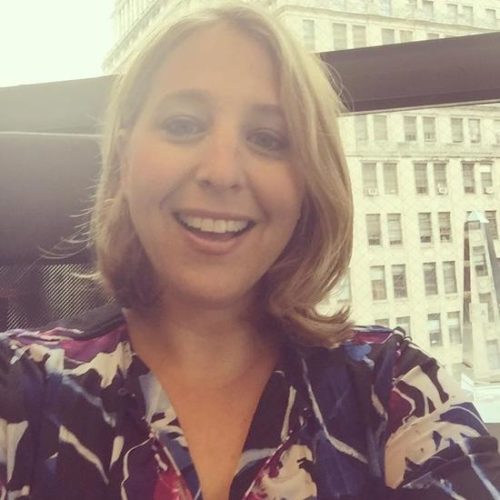
Jessica Daniels
Jessica Daniels is an Emmy and Artios Award-winning casting director. Select film credits include: THE 40-YEAR-OLD VERSION, LUCKY GRANDMA, SELAH & THE SPADES, THE MISEDUCATION OF CAMERON POST, ROXANNE ROXANNE, WIENER-DOG, WHITE GIRL, and NASTY BABY. Select television credits include 30 ROCK (NBC), DEADBEAT (Hulu), HELPSTERS (Apple), BRAINCHILD (Netflix), BENDERS (IFC), THE CARRIE DIARIES (CW), and STARVED (FX). From 2013-2019, Jessica served as the New York Pilot Season Casting Director for 20th Century Fox and Fox 21 Television Studios. In 2019, she joined Walt Disney Television Studios as VP Casting in New York.

Lisa Ystrom
Lisa is a Los Angeles native and has been in casting since 1998. As a Casting Associate, she worked on projects including Pasadena, My Big Fat Greek Wedding, Huff, Everybody Loves Raymond, and HBO’s The Pacific. As a Casting Director, she has worked on projects including Suburgatory, The Lying Game, A to Z, Young & Hungry, Powerless, Falling Inn Love, Spinster, and Dashing in December among others. For more credits, go to IMDB.com.
References
- 1Multiple. "Average Casting Director Salary in Los Angeles, California". PayScale. published: January 25, 2021. retrieved on: March 30, 2021
